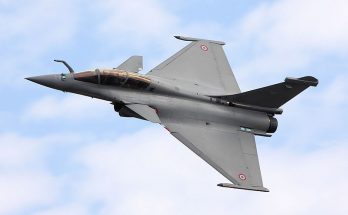At the first NATO Defense Ministers meeting of 2020, Britain’s defense secretary, Ben Wallace, used the occasion to reassure NATO’s European members that the United Kingdom remains a key element of broader European security.
On February 12, Wallace announced multiple contributions Britain plans to make toward NATO initiatives, with the most significant involving his signature on a Readiness Declaration that committed the U.K.-led Joint Expeditionary Force (JEF) to the Alliance’s Readiness Initiative.
Defence Secretary @BWallaceMP underlined the UK’s commitment to NATO at #DefMin today. He announced that:
✅RAF Typhoons will conduct air policing in Lithuania this summer.
✅The UK-led JEF will contribute to NATO’s Readiness Initiative.
More: https://t.co/Q9QwY7fCS6 pic.twitter.com/ree0onlW37
— Ministry of Defence 🇬🇧 (@DefenceHQ) February 12, 2020
Despite Britain’s official exit from the European Union – the so-called Brexit – on January 31, the U.K. has no choice but to retain a fixed gaze toward the continent. Whether through trade, long-standing security ties or common values, there is much at stake for British interests in Europe. With the U.K. featuring arguably the most capable military component of all European members within NATO, both London and Brussels have an interest in maintaining cooperative stances in the area of defense and security.
As Russia continues modernizing its armed forces and utilizing an array of tactics to destabilize countries on its western border and splinter European Union and NATO solidarity, London has little choice but to acknowledge the need for security vigilance in Europe and the return of peer-state competition.
European nations abutting Russia’s border or in geographic proximity recognize the need for allied partners and seek security reassurance through declarations of support and troop deployments on their soil. Senior dual EU-NATO members such as Germany see the need for Britain to continue aiding in European security through dialogue, joint training, the development of defense equipment, troop contributions, and diplomatic convergence on perceived threats.
Much of this remains to be ironed out through a trade agreement London hopes to cement with Brussels by the end of the year. Thorny areas where disagreement is entrenched and seemingly immovable – such as British access to military-grade data from the European Galileo global navigation satellite system or the European Defense Fund for industrial projects– are unlikely to be resolved at the negotiating table.
But in a sign that London is not turning its back on NATO or its long-standing European partners, the U.K. is allocating land and maritime capabilities for Alliance needs under the Readiness Initiative. These include a U.K.-led land brigade and a U.K. Carrier Strike Group via the JEF.
The JEF began being formulated at the NATO summit in Wales in September 2014. It represents a high-readiness multi-domain force pool drawn from nine partner countries (Denmark, Estonia, Finland, Latvia, Lithuania, the Netherlands, Norway, Sweden and the U.K.). Noticeable in this composition are two countries that are not NATO members but coordinate closely with the Alliance – Finland and Sweden (each joined the force pool in June 2017), plus five countries that share a border with Russia (Estonia, Finland, Latvia, Lithuania and Norway).
The JEF was declared to have reached Initial Operational Capability (IOC) in November 2015 and Full Operational Capability (FOC) in July 2018.
While the U.K. is the framework nation in the JEF, each country retains full sovereignty over its troop contribution to the force pool.
Capable of drawing upon air, land and sea capabilities on short notice, the JEF – through its stress on force interoperability – provides a plug-and-play rapid reaction component capable of tackling multiple operational scenarios ranging from combat operations to humanitarian support and disaster relief, civilian evacuation, peace support missions, and medium-scale interventions. It may conduct missions as a coalition or as a component within the NATO Alliance, thus allowing for flexibility where political unanimity among all 29 members of NATO proves elusive.
The value of the JEF is most apparent in defense of Europe’s northern reaches against potential threats, foremost being Russia, which continues to conduct incursions into the national air and maritime space of the Nordic states and large-scale snap military exercises along the borders of NATO members.
But its added value to Britain is in showing Europe it is not turning its back on collective defense and security on the continent as it seeks leverage with Brussels at the negotiating table.
On the margins of @NATO #DefMin, like-minded #Allied nations 🇬🇧🇩🇰🇪🇪🇱🇻🇱🇹🇳🇱🇳🇴 declared in Brussels readiness of the UK-led Joint Expeditionary Force #JEF, which supports #NATO’s deterrence & collective defence efforts pic.twitter.com/7MHeQmlVXi
— Netherlands at NATO (@NLatNATO) February 12, 2020
Dan Darling is Forecast International’s director of military and defense markets. In this role, Dan oversees a team of analysts tasked with covering everything from budgeting to weapons systems to defense electronics and military aerospace. Additionally, for over 17 years Dan has, at various times, authored the International Military Markets reports for Europe, Eurasia, the Middle East and the Asia-Pacific region.
Dan's work has been cited in Defense News, Real Clear Defense, Asian Military Review, Al Jazeera, and Financial Express, among others, and he has also contributed commentary to The Diplomat, The National Interest and World Politics Review. He has been quoted in Arabian Business, the Financial Times, Flight International, The New York Times, Bloomberg and National Defense Magazine.
In addition, Dan has made guest appearances on the online radio show Midrats and on The Media Line, as well as The Red Line Podcast, plus media appearances on France 24 and World Is One News (WION).




